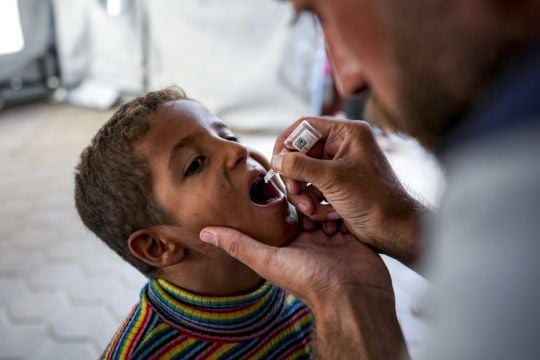The UN children’s agency has said a polio vaccination campaign in Gaza reached 189,000 children, surpassing its target and providing a “rare bright spot” in nearly 11 months of war.
Unicef said more than 500 teams deployed across central Gaza this week, administering the vaccine to children under 10.
It said Israel and Hamas observed limited pauses in the fighting to facilitate the campaign.
UN agencies now hope to expand the campaign to the harder-hit north and south of the territory. They hope to vaccinate a total of 640,000 children.
“We hope that this polio vaccine will be provided to all of #Gaza as protection for all our children"@UNRWA teams & partners continue to vaccinate children in clinics, mobile health points & shelters & are even going tent to tent
Now is the time to prioritise children’s health pic.twitter.com/rsCiJ9XbutAdvertisement— UNRWA (@UNRWA) September 3, 2024
The campaign was launched after Gaza had its first reported polio case in 25 years – a 10-month-old boy, now paralysed in the leg.
Health experts have warned of disease outbreaks in the territory, where the vast majority of people have been displaced, often multiple times, and where hunger is widespread.
Hundreds of thousands of people are crammed into squalid tent camps with few if any public services.
Later on Wednesday, Germany, a close ally of Israel, said a ceasefire agreement with Hamas must have the “highest priority”. The foreign minister is expected to underline the message on a trip to the Middle East this week.
Government spokesperson Wolfgang Buchner said the killing of six Israeli hostages “has once again made clear that a ceasefire that opens the way to the freeing of all hostages held by Hamas must now have the highest priority. Other considerations should stand back”.
He called on all involved in the negotiations to show flexibility and readiness to compromise, and said an agreement could also help de-escalate regional tensions.
Foreign minister Annalena Baerbock will visit Saudi Arabia, Jordan, Israel and the West Bank to speak to regional officials, including Israel’s foreign and defence ministers and the Palestinian prime minister.
It will be her 11th visit to the Middle East and her ninth to Israel since Hamas’s attack on Israel triggered the war nearly 11 months ago.







